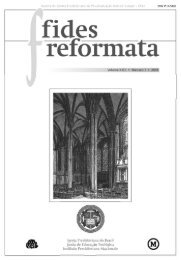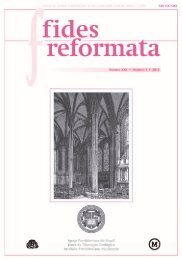Fides 22 N2
Um publicação do Centro Presbiteriano de Pós-graduação Andrew Jumper.
Um publicação do Centro Presbiteriano de Pós-graduação Andrew Jumper.
Create successful ePaper yourself
Turn your PDF publications into a flip-book with our unique Google optimized e-Paper software.
FIDES REFORMATA XXII, Nº 2 (2017): 139-162<br />
de Léry’s report about the voyage to South America in 1556. The church in<br />
Geneva sent two ministers of the gospel, not four, and they were never called<br />
“missionaries” but “ministers of the Word of God.” By using the biblical<br />
term “minister of the Word,” when referring to those sent with the responsibility<br />
of preaching the gospel, Calvin preserved the Scriptural terms and did not fall<br />
into the temptation to reason from alien terminologies.<br />
Tucker concludes with this sad note: “None of these ventures had real<br />
staying power.” 99 Does that mean then that martyrdom does not count as<br />
“missionary” success? Does it mean then that we only call it “missions” if it<br />
succeeds in terms of church planting and church growth?<br />
SUMMARY OF THE TWO ARTICLES<br />
The previous article (Part 1) and the present one (Part 2) have considered<br />
some aspects of the life and research of mission historians Warneck, Neill,<br />
Kane, Winter, and Tucker, with particular attention given to their writings related<br />
the reformers and missions. An examination of the sources they used calls<br />
into question whether their use and interpretation of the sources corresponds<br />
to the historical reality of the sixteenth-century mission enterprise. Their use<br />
of contemporary missiological terminology has undoubtedly affected their<br />
assessment of the reformers. The prevailing thesis that the reformers were<br />
silent and even indifferent to the idea of missions began long ago based upon<br />
inadequate research.<br />
Warneck and Latourette were doubtless the main proponents of the theory<br />
that dismisses the reformers’ concern for or even thought of “missions,” as<br />
the two historians define, categorize, and applied it. The overall spread and<br />
popularization of such beliefs, however, should be credited to Warneck and<br />
Latourette’s followers and friends, including Neill, Kane, Winter, and Tucker.<br />
Their writings and arguments have been translated into several languages and<br />
their influence throughout the world cannot be denied. 100 Unfortunately numerous<br />
mission professors, most theological students, missionary candidates,<br />
and mission-minded members of the church in general never question such<br />
statements, nor research the documented literature that deals more seriously<br />
with the subject commented on here. Even less take the time to find and read<br />
the sixteenth-century documents and the writings of the reformers.<br />
Why have reputable mission historians made such declarations so lightly?<br />
Are they consciously manipulating the data to demise the theological beliefs and<br />
99 Ibid., 68.<br />
100 The prolific missiological writings of Warneck and Latourette have a limited audience, but the<br />
mission histories of Neill, Kane, Winter, and Tucker have reached a broader and more popular audience,<br />
even Sunday School classes.<br />
161




